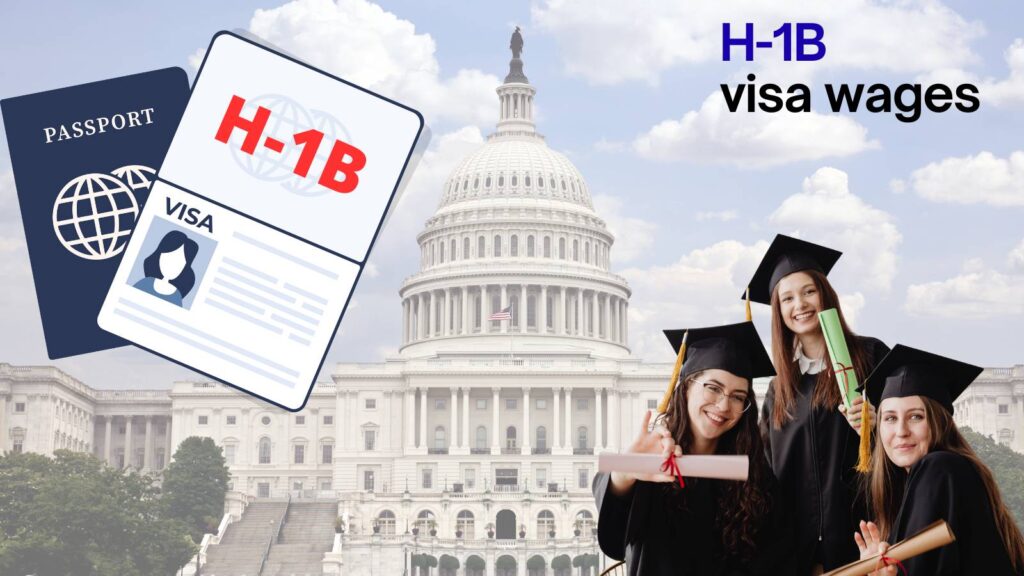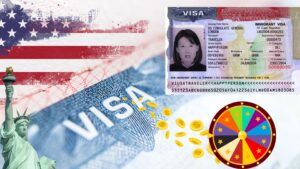The H-1B visa program has long been a vital gateway for international graduates seeking to launch their careers in the United States. Recent changes to the H-1B system, which now prioritize applicants based on wage levels, pose new challenges—particularly for entry-level international graduates. While these reforms aim to ensure fair compensation and protect American workers, they inadvertently create barriers for fresh graduates who often accept lower starting salaries to gain crucial experience.
H-1B Visa 2025 – Everything You Need to Know Before Applying
Know, how the new wage-based H-1B system could disadvantage entry-level international graduates, examining the impacts on their job prospects, career growth, and financial stability in today’s competitive labor market.
Introduction to the New Wage-Based H-1B System
The H-1B visa program has been a cornerstone of the United States’ strategy to attract highly skilled international professionals, particularly recent graduates from U.S. universities and foreign institutions. This visa allows employers to temporarily employ foreign nationals in specialty occupations that typically require a bachelor’s degree or higher.
USA H-1B Work Visa 2025: Application Period Starts – Apply Now!!
In 2025, reforms introduced a new wage-based system that ties eligibility for the H-1B visa more strictly to prevailing wage requirements set by the Department of Labor. The goal of this system is to ensure that foreign workers are paid fairly relative to their American counterparts, thereby protecting U.S. workers from wage suppression and exploitation.
While these reforms aim to strengthen the labor market and improve wage fairness, they also raise serious concerns about unintended consequences for entry-level international graduates. These fresh graduates, often starting their careers with lower wages and less experience, may find themselves at a disadvantage under the new wage-based system. It is essential to examine how these changes affect their chances of obtaining an H-1B visa and what that means for their professional futures.
Wage Levels and Their Impact on Entry-Level Applicants
The Department of Labor defines prevailing wage levels in a tiered structure that classifies jobs and experience into four levels. Level 1 wages correspond to entry-level positions that require basic skills and minimal experience, while Levels 2, 3, and 4 increase progressively to reflect intermediate, experienced, and highly specialized roles. Employers sponsoring H-1B candidates must now pay wages that meet or exceed these prevailing wage levels.
H-1B Lottery: How to Apply, Results!
For entry-level international graduates, this means that the baseline salary an employer must offer has increased significantly compared to previous standards. Many entry-level jobs, especially in industries like technology, education, and engineering, traditionally offered salaries below these newly mandated wage floors.
This creates a gap where employers might be hesitant to sponsor candidates whose required wage exceeds what the employer is willing to pay for an entry-level position. Consequently, the wage system indirectly filters out many recent graduates, forcing them to compete against candidates with higher experience and salary expectations.
The increased wage floors under the new H-1B visa wages system are intended to prevent underpayment, but they do not always consider the realities of entry-level labor markets, particularly for international students who often accept lower starting salaries to gain valuable work experience.
Challenges Faced by Entry-Level International Graduates
Entry-level international graduates encounter several significant challenges due to the new wage-based H-1B system. First, the heightened wage requirements mean that fewer employers are willing or able to sponsor fresh graduates. Many startups and small to medium-sized enterprises operate under tight financial constraints and find it difficult to meet the prevailing wage demands. As a result, these companies may reduce their sponsorships or limit hiring exclusively to candidates who already possess several years of experience.
Second, the competitive nature of the H-1B visa lottery process means that applicants with higher wage offers — usually experienced professionals — have better chances of selection. Entry-level graduates, with their lower wage brackets and less work history, often fall behind in this competitive landscape. The combination of increased wage floors and the lottery selection system makes it even more challenging for them to secure the visa.
Finally, the new system places graduates in a precarious position regarding career planning and financial stability. They face longer periods of uncertainty during job searches, and the possibility of not receiving H-1B sponsorship can lead to delays in starting their professional lives in the United States.
Financial and Career Implications for Graduates
The repercussions of the wage-based H-1B reforms extend beyond just visa eligibility. Entry-level international graduates face direct financial consequences, as employers adjust salary offers to meet the new wage requirements. This often results in fewer available positions that meet the wage threshold or in employers cutting back on the number of sponsored entry-level roles.
From a career perspective, these constraints translate into delayed entry into the U.S. workforce, which can hamper professional development. When graduates spend extended periods without employment or under temporary visa statuses like Optional Practical Training (OPT), they miss critical opportunities for gaining work experience, networking, and skill enhancement. This delay may have a ripple effect on long-term career growth, promotions, and salary increases.
Some graduates may be forced to accept jobs that do not fully utilize their skills or are outside their chosen fields, just to maintain legal status and income. This underemployment can erode morale and limit their contributions to the U.S. economy.
Summary of Financial and Career Impacts:
- Starting Salaries: Employers may reduce the number of entry-level offers to meet higher wage floors.
- Workforce Entry: Graduates face longer job search times and visa processing delays.
- Career Growth: Limited early work experience may affect future promotions and salary trajectories.
Employer Perspectives and Hiring Practices
Employers must navigate the complexities of the new wage-based H-1B system, balancing compliance with financial feasibility. Many companies, particularly startups and smaller firms, express concerns over the increased costs associated with higher H-1B visa wages. This financial strain often leads to shifts in recruitment strategies.
Larger corporations might have the resources to meet these wage requirements and may focus their sponsorship on candidates who already possess substantial experience. In contrast, smaller companies may choose to reduce their reliance on international talent or look toward alternative solutions such as outsourcing, automation, or hiring domestic employees instead.
This shift in hiring practices has direct implications for the labor market. It narrows the pipeline for entry-level international graduates, limiting their opportunities and potentially depriving companies of fresh perspectives and innovation that younger professionals often bring.
Potential Policy Gaps and Criticism
While the new H-1B visa wages system aims to protect American workers, it has drawn criticism for creating barriers to entry for new international graduates. Critics argue that the prevailing wage calculations do not adequately account for regional economic disparities or sector-specific nuances, which can unfairly disadvantage entry-level roles.
By disproportionately impacting recent graduates, the policy may undermine the United States’ ability to attract and retain global talent essential for innovation and competitiveness in the 21st century. Some experts warn that overly stringent wage floors risk stifling the professional growth of young workers and reduce the diversity of the labor market.
Advocacy groups have called for reforms that maintain wage protections while introducing more flexibility for entry-level roles to preserve opportunities for emerging talent.
Strategies for Entry-Level Graduates to Navigate the New System
Despite these challenges, entry-level international graduates can take proactive measures to enhance their prospects within the constraints of the new H-1B wage system. Gaining practical experience through internships, co-op programs, and OPT is critical. Such experience increases a candidate’s value to employers and can help justify meeting prevailing wage requirements.
Graduates should also explore alternative visa categories that might offer more flexible wage standards, such as the O-1 visa for individuals with extraordinary abilities or employment-based green cards where possible.
Additionally, networking with employers known for sponsoring entry-level H-1B candidates can be highly beneficial. Seeking mentorship can open doors and provide valuable guidance throughout the complex process. Therefore, combining these strategies can significantly improve a graduate’s chances of success.
Pursuing additional education, certifications, or skill development can further enhance eligibility by moving candidates into higher wage tiers based on their qualifications.
Future Outlook and Possible Reforms
The future of the wage-based H-1B system is still evolving, with ongoing discussions among policymakers, employers, and advocacy groups about how best to balance wage protections with access to international talent. Potential reforms may include:
- Adjusting prevailing wage calculations to better reflect entry-level realities and regional differences
- Creating exceptions or special provisions for recent graduates and early-career professionals
- Expanding the overall visa cap or establishing new visa categories designed for entry-level international workers
Such reforms could mitigate the disadvantages currently faced by entry-level graduates while maintaining the integrity of wage protections.
With thoughtful reforms, proactive strategies, and ongoing dialogue, the system can evolve to better accommodate entry-level international graduates without compromising wage standards.
FAQs
1. What is the new wage-based H-1B system?
It’s a revised H-1B visa selection process that prioritizes applicants based on offered wage levels rather than a lottery.
2. How does the new system impact entry-level international graduates?
Entry-level graduates may face disadvantages as higher wage requirements could limit their job eligibility.
3. What wage levels are considered under the new H-1B system?
The system categorizes wages into four levels based on job duties and geographic location, with higher wages given priority.
4. Why does the new wage-based system favor higher-paid positions?
It aims to protect U.S. workers by prioritizing skilled workers in higher-paying roles.
5. Can entry-level graduates negotiate higher wages to qualify?
Negotiating higher wages is possible but may be challenging for entry-level roles, affecting their chances.
6. Will the new system reduce the number of H-1B visas awarded to entry-level workers?
Yes, the emphasis on wages likely decreases opportunities for entry-level international graduates.
7. Does the wage-based system affect all industries equally?
No, industries with typically lower entry-level wages may see a greater impact.
8. Are there exceptions for certain job roles or locations?
Wage levels vary by job category and location, but the system still prioritizes higher wages overall.
9. How should international graduates prepare for the new wage-based system?
Graduates should focus on gaining skills that command higher wages and seek employers willing to meet wage criteria.
10. Where can I find official information about the new H-1B wage rules?
Official updates are available on the U.S. Citizenship and Immigration Services (USCIS) website.






